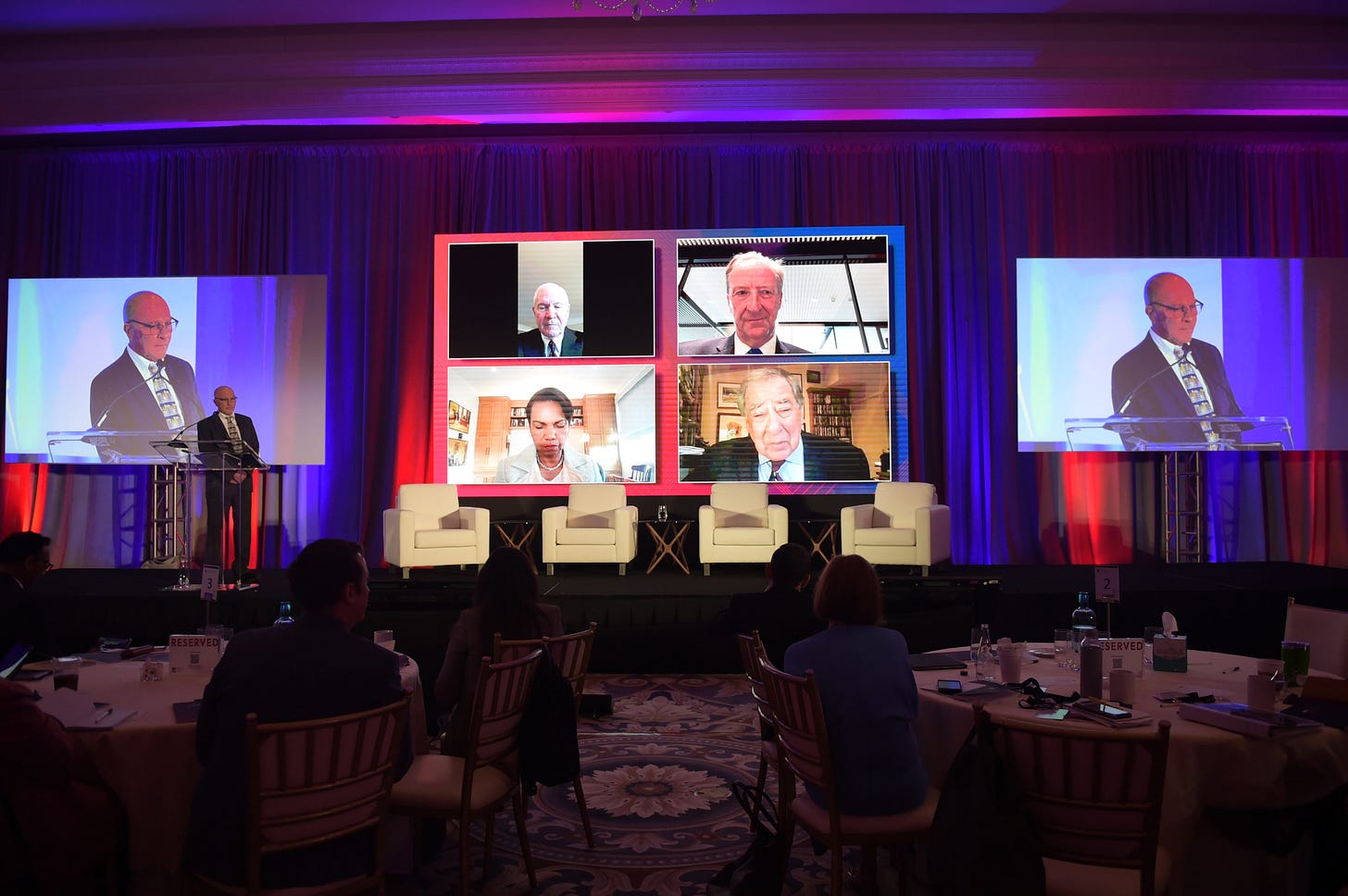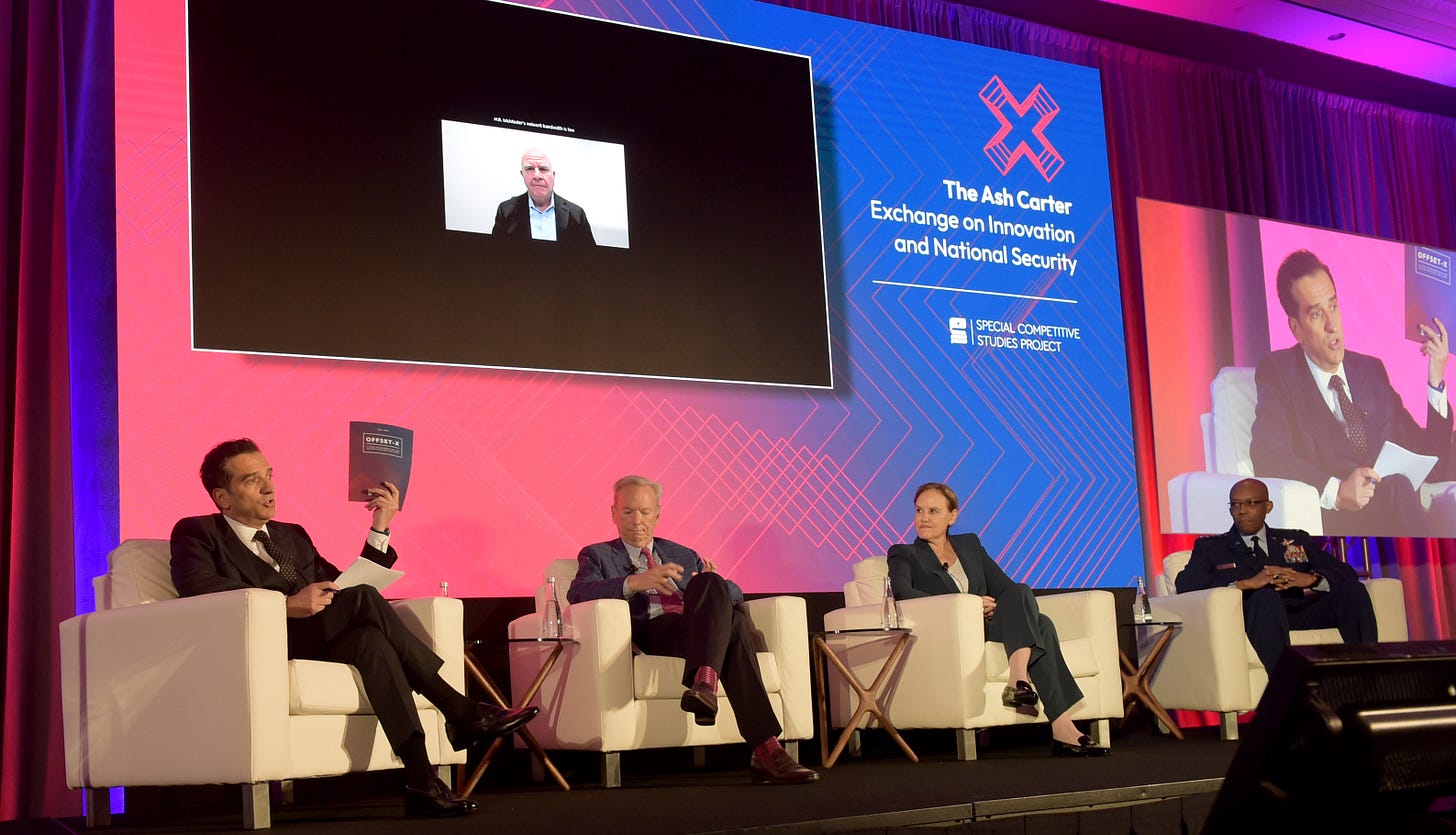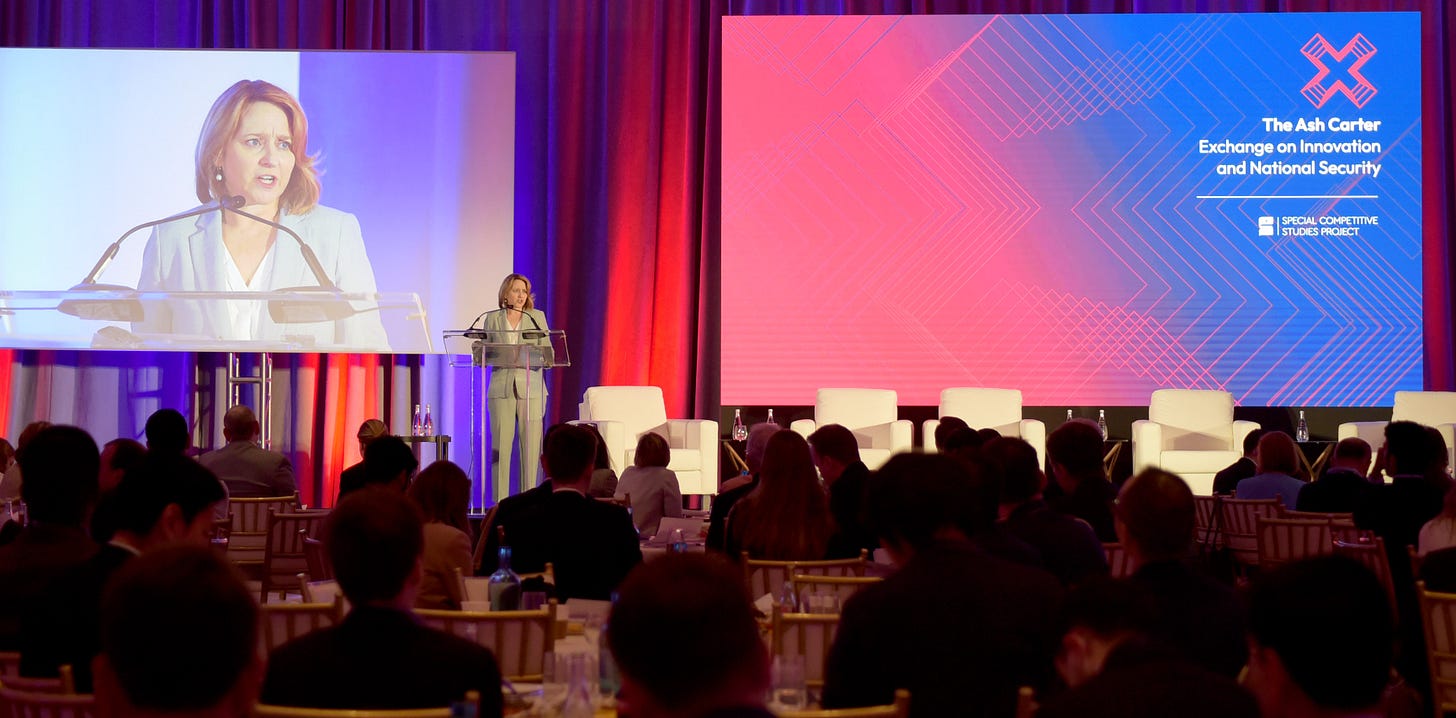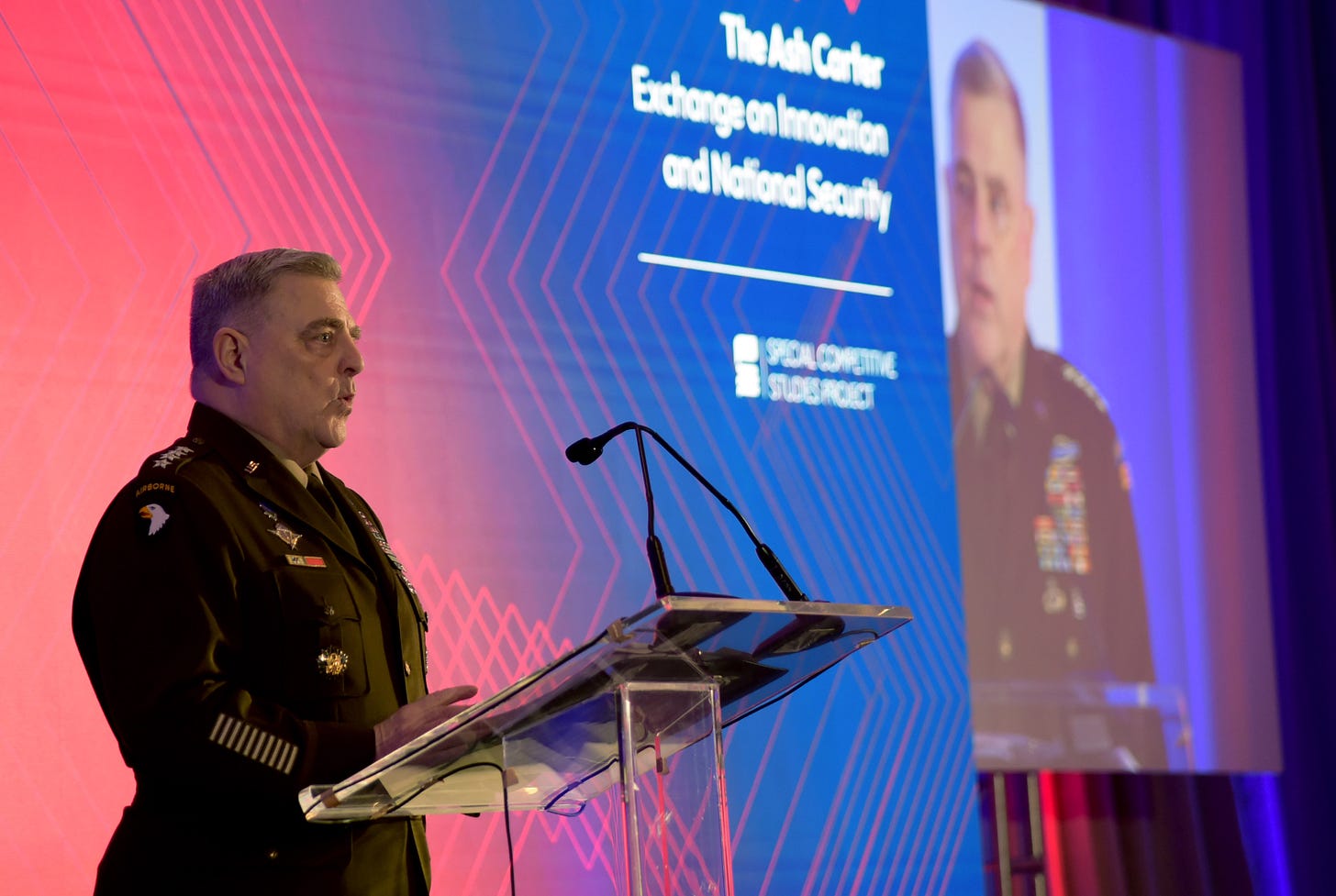The Ash Carter Exchange on Innovation & National Security
Highlights from The Exchange held on May 9, 2023 in Washington, DC honoring the legacy of Dr. Ash Carter.
Hello, I’m Ylli Bajraktari, CEO of the Special Competitive Studies Project. In this edition of 2-2-2, members of SCSP’s Defense Panel – Jung-Ju Lee, Director and Luke Vannurden, Associate Director – share highlights from the Ash Carter Exchange on Innovation and National Security that we convened on May 9, 2023.
The Special Competitive Studies Project (SCSP) was created in October 2021 to develop a non-partisan, public policy agenda that can help ensure America’s long-term competitiveness as AI and other emerging technologies reshape our society, economy, and national security.
Few leaders embody our mission as fully as former Secretary of Defense Dr. Ash Carter. A mentor to several of us at SCSP, Dr. Carter was a once-in-a-generation leader who uniquely understood the impact of emerging technology on national security long before it became more widely accepted. He advocated tirelessly, in and out of government, for innovation and left a lasting imprint on defense and national security through his leadership and foresight. The nation is better prepared for the challenges ahead thanks to his service.
In his honor, SCSP and Mrs. Stephanie Carter last week jointly hosted the Ash Carter Exchange on Innovation and National Security in Washington, DC. The Exchange brought together a distinguished group of pioneers and champions of innovation in national security from the government, private sector, and the scientific community for a day of conversation with nearly 2,000 in-person and virtual attendees. Thank you to all who participated!
Highlights from The Ash Carter Exchange
Dr. Sherwood-Randall spoke about the importance of not just harnessing the potential of technology for the public good, but also of mitigating risks associated with the double-edged sword of select technologies. She outlined efforts along four areas in which technologies have had profound impact on homeland security: biodefense, counterterrorism, national resilience, and migration. She explained how our homeland security toolset must be engineered with end-to-end resilience and security, particularly cyber, and protect privacy and civil liberties.
U.S. Secretary of the Air Force Frank Kendall
Secretary Kendall discussed the seven operational imperatives for innovation in the Air Force and Space Force in response to China’s military modernization. He observed that it’s very hard to know if China has or will achieve parity with the United States until our capabilities are tested in an operational setting – but time is clearly not on our side. China is a pacing challenge that is running fast to stay ahead and it is developing countermeasures to our future, not present, capabilities. He concluded that there is great urgency to thinking ahead and moving forward competitively to stay ahead of China.
General Smith and Bob Work discussed the imperative of a new force design to fight the next - not last - war. Secretary Work observed that the U.S. Marine Corps’ Force Design 2030 is the most far-reaching transformation of a service since the Cold War - and possibly longer. General Smith explained that Force Design 2030 was developed to meet the pacing challenge posed by China and transform our forces to operate inside China’s weapons engagement zone in the Indo-Pacific amid fundamental changes to the character of war. General Smith assured that the capabilities developed for the Indo-Pacific theater are exportable and the U.S. Marine Corps will continue to be an expeditionary combined arms force with global employment.
Panel on Innovation, Geopolitics, and Grand Strategy
The panel featured 22nd U.S. Secretary of Defense Dr. Robert Gates, 23rd U.S. Secretary of Defense Leon Panetta, 66th US Secretary of State Dr. Condoleezza Rice, and 16th Chief of MI6 Sir Alex Younger and was moderated by Thom Shanker of the Project for Media and National Security. The panel discussed the trajectory of the war in Ukraine, the future of Russia, and how the Western alliance can manage the growing relationship between Russia and China. Dr. Gates explained how the outcome of the war in Ukraine depends on the success of the upcoming Ukrainian counter-offensive in driving to a negotiated outcome. Dr. Rice observed that the fundamentals of geopolitics have been transformed by the Russian invasion and that Russia will not be a part of the modern international system as long as Putin remains in power. Sir Alex Younger explained that Russia and China represent an Axis of Autocracy that has little in common but are fundamentally joined in repudiating the U.S.-led world order. Secretary Panetta spoke about how the United States must strengthen deterrence and make clear that we will respond to an invasion of another democracy.
Panel on Future of Defense Innovation
The panel featured Air Force Chief of Staff General C.Q. Brown, Jr., Co-Founder of WestExec Advisors Michèle Flournoy, Chair of the Special Competitive Studies Project Dr. Eric Schmidt, and the 25th National Security Advisor Lieutenant General (ret.) H.R. McMaster and was moderated by SCSP CEO Yll Bajraktari. The panelists discussed lessons the United States should learn from the war in Ukraine and how technology is changing the character of warfare. General Brown emphasized the importance of logistics, strong alliances and partnerships, and the will to fight in conflict, cautioning that conflicts nowadays usually last longer than we expect. Ms. Flournoy observed that the war in Ukraine undermined the assumption that a country can painlessly take over another to rapidly and fundamentally change the status quo. General McMaster explained that even with new technologies and operational concepts, we cannot ignore the continuities in the conduct of war. Dr. Schmidt discussed the unprecedented speed at which large language models have progressed and the diffusion of knowledge from expensive, specialized models to open-source that is rapidly leaking our advantage to competitors.
Panel on Innovation, Cyber, and Emerging Technologies
The panel featured Director of the Cybersecurity and Infrastructure Security Agency Jen Easterly, U.S. State Department Ambassador at Large for Cyberspace and Digital Policy Nate Fick, and Deputy National Security Advisor for Cyber & Emerging Technology Anne Neuberger and was moderated by Eric Rosenbach of Harvard University. DNSA Neuberger discussed the importance of clear communication in deterring Russian cyberattacks against allies and partners in the lead up to and during the war of aggression against Ukraine. Ambassador Fick emphasized the value of capacity building for allies and noted the degree to which the war in Ukraine had helped to accelerate needed public-private coordination and partnership on cyber defense. Director Easterly predicted we will most likely see attempted cyberattacks on the homeland in a conflict with China, and stressed the urgency of achieving societal resilience.
Panel on Innovation in Defense Research and Acquisition
The panel featured the newly appointed Director of the Defense Innovation Unit (DIU) Doug Beck, the CEO of Istari and former Assistant Secretary of the U.S. Air Force and Space Force Dr. Will Roper, Shield Capital Managing Partner and former head of DIU Raj Shah, and Director of Defense Advanced Research Projects Agency (DARPA) Dr. Stefanie Tompkins and was moderated by Sally Donnelly of Pallas Advisors. Dr. Roper explained that Dr. Carter kindled a spirit of innovation in government but the process is not yet organized to bring innovation into defense at scale. Mr. Shah advocated for a venture capital mindset, which involves feeding the early adopters and winners, and scaling them across the Department. Mr. Beck described the critical importance of aligning military problems and commercial technologies to rapidly prototype and field solutions at scale for the most strategic problems. Dr. Tompkins observed that we also need to scale the experimental mindset, not just the technologies or processes, to achieve continuous change in the future.
Deputy Secretary of Defense Dr. Kathleen Hicks
Deputy Secretary Hicks spoke about the generational challenge we are facing in a new era of strategic competition against an adversary that has the will and increasingly the capability to remake the world order. She stated that it is in America’s DNA to innovate and called for defense innovation in every form - new technologies, processes, tactics, techniques, and procedures - in response to this challenge. She noted that despite the proliferation of innovation mechanisms and organizations, implementation has been slower than it should be - our problem may be “innovation adoption,” not innovation itself. She concluded that our task then is to stand up, solidify, and scale the internal structures that enable innovation to thrive across the Department and allow us to get the right things to the right people at the right time in the battlespace to make a difference.
Panel on New Tech Solutions to National Security Challenges
The panel featured Palantir Chief Technology Officer Aki Jain, Rebellion Defense CEO Chris Lynch, Pentagon Chief Data and AI Officer Dr. Craig Martell, and SpaceX Vice President General Terrence O’Shaughnessy (ret.) and was moderated by Dr. DJ Patil of Great Point Ventures. The panelists discussed the role of scale in bringing new technology solutions to bear on national security challenges. Mr. Jain described scale as the greatest concern in innovation, and Dr. Martell stressed the importance of scaling pockets of technological excellence across the defense establishment. General O'Shaughnessy stressed the importance of marrying commercial innovation to government requirements in an affordable, scalable way to deliver combat-relevant capabilities to warfighters at pertinent speed. Mr. Lynch spoke about developing talent, specifically by communicating the mission of national security and defense to attract software engineers, product managers, and designers needed to implement software – the cornerstone of future combat – across defense.
Panel on New Frontiers of Innovation
The panel featured Director of the Lawrence Livermore National Laboratory Dr. Kim Budil, President Emerita of Rensselaer Polytechnic Institute Dr. Shirley Ann Jackson, and Massachusetts Institute of Technology Vice President for Research Dr. Maria Zuber and was moderated by SCSP’s Dr. PJ Maykish. The panelists spoke about the need for personnel exchanges between the public and private sectors and infrastructure support for public universities to bring the best scientific minds into the national security space. Each panelist offered various examples of how innovation is impacting national security. Dr. Zuber explained how high-resolution observations from space are now unclassified and open societies will have the advantage in this “great opening.” Dr. Shirley highlighted applications of artificial intelligence and machine learning in biotechnology, which have ramifications for warfighting advantage and society writ large. Dr. Budil discussed the pioneering work that Lawrence Livermore scientists have done on energy fusion.
Chairman of the Joint Chiefs of Staff General Mark A. Milley
General Milley spoke about the urgency with which the U.S. military must adopt the best combination of technologies – integrated with the right training, doctrine, and organizational structure – to achieve advantage in the middle of the largest fundamental change to the character of war in all of human-recorded history. He reminded the attendees of the devastation of the last great power war in Europe and Asia. He concluded that great power war, however, is neither imminent nor inevitable. By demonstrating our readiness through modernization, the United States can continue to deter. He concluded with a call for a Joint Futures Command that can help to bring to bear a vision of a joint force that is able to deter and prevail under the changing conditions of conflict.
Offset-X: Closing the Deterrence Gap and Building the Future Joint Force
To help further drive innovation in defense and national security, SCSP released the Defense Panel’s second report on Offset-X: Closing the Deterrence Gap and Building the Future Joint Force. In response to a historical challenge posed by China’s evolving military capabilities and operational concepts, and the significant evolution in the character of conflict, the new Offset-X report provides three essential elements: a competitive institutional strategy, real-world capabilities required to operationalize it, and the design characteristics of a Future Joint Force needed to employ these capabilities. Cumulatively, these three elements can close the window of vulnerability the United States may face in the Indo-Pacific in the 2025-2030 timeframe, and position the nation for an enduring competition.
Save the Date: Global Emerging Technology Summit 2023
We are excited to announce that we will be hosting our annual Global Emerging Technology Summit on September 21, 2023. The Summit will work to bring our allies and partners closer to our conversations on technology and national security. Please stay tuned for more details and subscribe to our newsletter!











